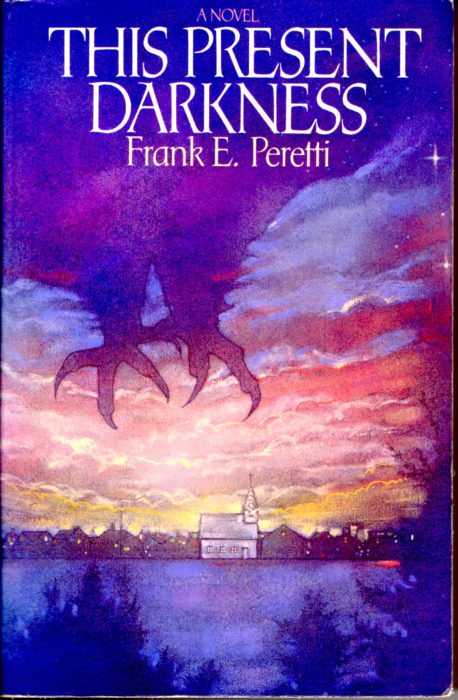9. What If the Armies of Hell Tried to Invade Your Hometown? | This Present Darkness
Podcast: Play in new window | Download (Duration: 51:58 — 48.9MB) | Embed
Plot twist: Christians have always believed in evil, unseen agents, and in the far greater power of the Lord to whom we pray.
This is the theme of Frank E. Peretti’s classic spiritual-warfare thriller This Present Darkness (1986). Lorehaven’s own review chief, Austin Gunderson, joins E. Stephen Burnett and Zackary Russell to explore this classic tale of good, evil, and praying saints versus the New Age movement.
Pitching This Present Darkness
Ashton is just a typical small town. But when a skeptical reporter and a prayerful, hardworking pastor begin to investigate mysterious events, they suddenly find themselves caught up in a hideous New Age plot to enslave the townspeople, and eventually the entire human race.
Not since “The Screwtape Letters” has there been a novel with as much insight into spiritual warfare and the power of prayer. Fast-moving, riveting reading ranking with the best thrillers on the bookshelf.
From Austin Gunderson’s article
In the early 1980s, “Christian speculative fiction” wasn’t a thing. Sure, Pilgrim’s Progress and Ben-Hur were staples in Christian libraries, and J. R. R. Tolkien and C. S. Lewis were giants. But fantastical fiction targeted specifically at a Christian audience hadn’t come into its own.
That all changed when struggling former pastor Frank E. Peretti’s This Present Darkness was published in 1986.
Peretti’s supernatural thriller begins in Ashton, a small college town on the northwestern plains. One wouldn’t consider this place as ground zero for a demonic conspiracy to dominate the globe. But the essential conceit of Peretti’s story is that human action affects the spiritual plane, and vice-versa.
Lorehaven is our free quarterly digital magazine. Go to Lorehaven.com to subscribe, and you’ll get each free issue linked in your inbox. Our spring issue has our cover story, “The Best of Christian Fantasy.” This features our well-read review team whose members chose their favorite Christian-made fantastic stories to review.
Why did Peretti stop writing Darkness novels?
In an October 1997 issue of WORLD Magazine, Gene Edward Veith interviewed Peretti. The story was called “This Present (and Future) Peretti.” There readers learned why the author wrote only two novels in his Darkness-verse.
What many of his readers took from the book, however, was not just that the culture wars have a spiritual significance. They took the Darkness books as combat manuals for fighting devils. In prayer groups across the country, people were binding demons named after specific sins (Envy, Despair, Lust) and calling on angels to beat down devils in charge of particular cities and nations.
“That really alarmed me,” Mr. Peretti told WORLD.
People were taking his fiction literally, as if it were fact. Conversely, other Christians were taking theological issue with episodes in his book, as if his attempts to dramatize the importance of prayer meant that God is actually dependent on “prayer warriors.” Though he went on the speaking circuit to discuss spiritual warfare, he stressed that his books were symbolic, and that theological conclusions need to come out of the Bible rather than a work of fiction.
Part of the problem may have been that evangelicals simply are not used to fiction. As a result, some confuse fiction with reality. This problem is compounded today, Mr. Peretti points out, by Christian novels—such as the rash of Apocalyptic end-of-the-world novels with their Anti-Christ conspiracy theories—that do purport to be factual.
Mr. Peretti resolved not to write any more demons vs. angels books.
Other links
- Travis Perry’s What’s the Deal with the Devil? series on SpecFaith
Fantastical feedback
I very much enjoy the exposure to new stories I’ve not heard of before but even more, I appreciate the balanced approach our hosts bring to the varying degrees of theology and fantastical powers (and license) in their discussions of some pretty delicate issues. It is both freeing and cautionary at the same time and that is a tough needle to thread.
—Apple Podcasts review from “Flindee”
Mine would’ve probably been a picture book, but I’m not really sure which one. I just know I was always drawn to stories where something extraordinary or weird or unbelievable happened, and I remember getting disappointed when picture books didn’t have those elements and getting excited when I found one that did have those elements.
So there wasn’t a clear line for me. I remember reading Narnia and The Hobbit and Lloyd Alexander in middle school and “My Father’s Dragon” before that, but I was honestly always seeking that magic.
Like I read any Nancy Drew that looked like it had a ghost element first and was always disappointed when it was a Scooby Do-esque “fake ghost” trick.
—fantastical origin story from Heidi B.
Have you read This Present Darkness or other Peretti novels? What’s your origin story with those books? And any thoughts to share about spiritual warfare fiction with angels versus demons? Let us know in the comments or feedback form here.
Next on Fantastical Truth
Unless something big breaks, for episode 10, we’ll put on our hard hats and do a little deconstruction. That is, we’ll bounce off the recent “faith deconstruction” stories among Christians. We will ask, more positively, how excellent Christian-made stories can help us build up our hearts and imaginations–not just our heads!–so that we love Jesus more and can face the challenges of life.































Share your thoughts about this podcast episode